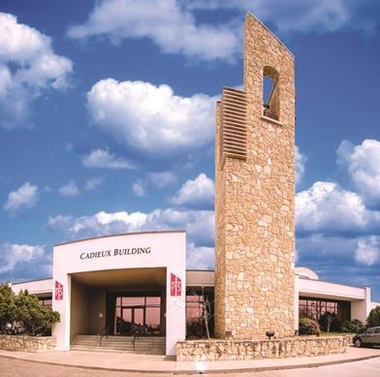Tulsa’s Phillips Theological Seminary emphasizes diversity

(Tulsa, OK) Tulsa is swiftly becoming an open-minded town and its graduate institutions are no different. Phillips Theological Seminary, located at 901 N. Mingo Road in Tulsa, prides itself on being progressive, said Dr. Gary Peluso-Verdend, the school’s President. “We like to think about ourselves as an alternative to a traditional religious education,” he said.
More than 100 years old, the seminary underwent several transitions before establishing itself as a freestanding institution in 1987. Originally in Enid, Okla., the seminary was relocated to Tulsa in 2003 after Quick Trip founder Chester Cadieux donated the corporation’s former headquarters to serve as the university’s new campus.
“We moved in to the former Quick Trip headquarters in fall 2003 and we’ve been there ever since.”
Phillips Theological Seminary is one of the few accredited graduate seminaries across the U.S. and Canada. “Our bread-and-butter work - our core work - focuses on educating people who are preparing for various kinds of professional ministry,” Peluso-Verdend said. “For the most part, that involves people who plan to lead congregations.”
The school has a small student population. “Like a lot of seminaries, we’re fairly small,” Peluso-Verdend said. “Our student population is generally around 150 students.”
“We serve predominantly mainline Protestant denominations - which means those who are more or less ecumenical in their outlook,” he said. “Our host denomination is the Christian Church Disciples of Christ; the second largest population in the seminary is United Methodist, then we’ll have a few handfuls of Baptists, Presbyterians, Unitarians and few people who aren’t really sure what they are.”
If you’re curious about religious studies, Peluso-Verdend said, Phillips is an ideal place to start. “We’ve been a leader for educating women in ministry in this part of the country and we put an emphasis on diversity of our student body in terms of gender, racial ethnicity and affirming gay, lesbian and transgender people.”
Peluso-Verdend said the seminary offers masters and doctorate level degrees in various areas of ministry and religion. “We offer several degrees in ministry, research work and professional doctorates,” he said. “Recently, we’ve expanded what we do programmatically to reach a wider audience.”
Citing the seminary’s identity statement, he said the college strives to be a “community seeking to learn the way of Jesus in order to cultivate vital community conversations [working] toward the public good.”
Peluso-Verdend said students at Phillips Theological Seminary come from all educational backgrounds and walks of life. “I don’t know whether or not God calls [certain] people into ministry, but I do know God calls people to seminaries sometimes to sort things out in their life,” he said. “It makes for a rich classroom environment.”
As far as the seminary’s curriculum goes, Peluso-Verdend said, the modes of teaching vary with the student population.
“We expect to attract a commuting student body, so we try to make the schedule accessible,” Peluso-Verdend said. “We teach on-campus and online, allowing us to serve students in states like Kansas and Arkansas.”
“In terms of what people learn in the classroom, they’ll learn in a variety of ways and learn about several different disciplines.”
Peluso-Verdend said Phillips Theological Seminary provides a different religious outlook than the ideals perpetuated throughout the Bible Belt. “There is an alternative to the dominant Protestant landscape in this part of the country,” he added.
“We, as a faculty, are much on the liberal and progressive side of the spectrum,” he said. “This means embracing the God-given gifts of everybody.”
For more information about Phillips Theological Seminary, visit www.ptstulsa.eduor call (918) 610-8303.
By Siali Siaosi, Journalism Intern
The Gayly – November 28, 2014 @ 10am





